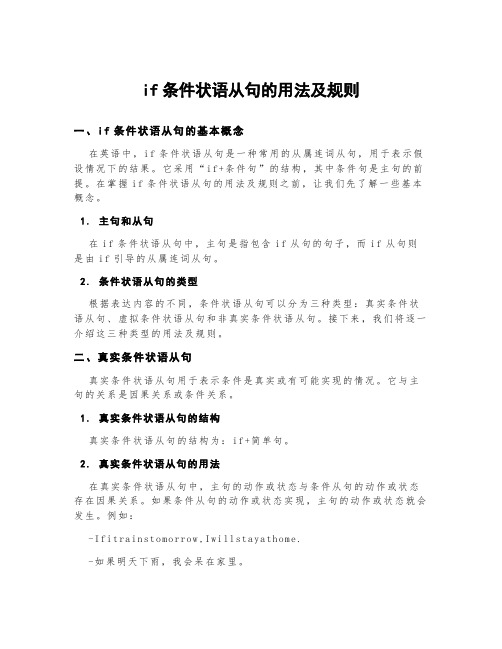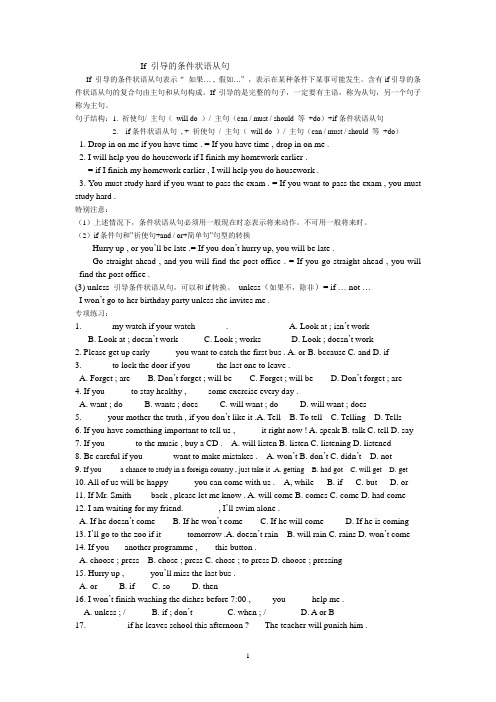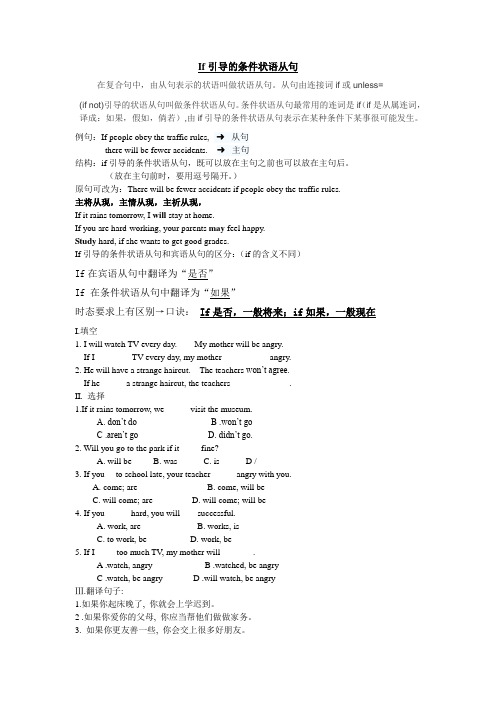if 条件状语从句
if条件状语从句的用法及规则

if条件状语从句的用法及规则一、i f条件状语从句的基本概念在英语中,i f条件状语从句是一种常用的从属连词从句,用于表示假设情况下的结果。
它采用“i f+条件句”的结构,其中条件句是主句的前提。
在掌握i f条件状语从句的用法及规则之前,让我们先了解一些基本概念。
1.主句和从句在i f条件状语从句中,主句是指包含if从句的句子,而i f从句则是由if引导的从属连词从句。
2.条件状语从句的类型根据表达内容的不同,条件状语从句可以分为三种类型:真实条件状语从句、虚拟条件状语从句和非真实条件状语从句。
接下来,我们将逐一介绍这三种类型的用法及规则。
二、真实条件状语从句真实条件状语从句用于表示条件是真实或有可能实现的情况。
它与主句的关系是因果关系或条件关系。
1.真实条件状语从句的结构真实条件状语从句的结构为:if+简单句。
2.真实条件状语从句的用法在真实条件状语从句中,主句的动作或状态与条件从句的动作或状态存在因果关系。
如果条件从句的动作或状态实现,主句的动作或状态就会发生。
例如:-I fi tr ai ns to mo rro w,I wi ll st ay at hom e.-如果明天下雨,我会呆在家里。
上述例句中,条件从句“if it ra in st omo r ro w”表达的是“下雨”的情况,主句“Iw il ls t ay at ho me”表示的是因果关系,即如果明天下雨,我将呆在家里。
三、虚拟条件状语从句虚拟条件状语从句用于表示条件是不真实、不可能实现或对现实进行推测的情况。
1.虚拟条件状语从句的结构虚拟条件状语从句的结构为:if+过去完成时。
2.虚拟条件状语从句的用法在虚拟条件状语从句中,条件从句的动作或状态无法实现,主句的动作或状态也会受到影响。
例如:-I fI ha ds tu di ed har d er,I wo ul dh av epa s se dt he ex am.-如果我学得更努力,我就能通过考试了。
if 引导的条件状语从句

一般现在时。 If you drive too fast, you may have an accident. You must stop if the traffic is red. If you finish the homework, you can go home. 如果你作业做完了就可以回家了。 If you want to lose weight you must/should eat less bread. 如果你想减肥,你必须少吃面包。
if引导的条件状语从句
If条件句:条件句用于陈述语气,表示将来的可能性,能力, 允
诺,命令,要求,请求,建议时,假设的情况可能发生,其中 if 是“假如, 如果”的意思。主句一般将来时 ,从句用一般现在时。
运用“主将从现”的原则。
构 成
条件从句
主句
时 态
If+一般现在时 主语+shall/will+动词原形
if引导的条件状语从句
主从句的时态?
If I get up late, I will be late for school. If I don’t finish my homework, I won’t go to bed. If you join the band(乐队), you will be famous.
• 除非天气不好,我每天早晨都要去散步。
• 3. I won‘t loan you unless you are in extreme need of money.
• 若不是你急需用钱,我不会借钱给你的。
if引导的条件状语从句
Summary(小结)
if 条件句不一般, 几个要点记心间; 条件句,放在前, 逗号要放句中间。 条件句表可能, 主将从现不一般; 条件句表事实, 主句常用现在时。
if 条件状语从句

If 引导的条件状语从句If 引导的条件状语从句表示“如果… , 假如…”,表示在某种条件下某事可能发生。
含有if引导的条件状语从句的复合句由主句和从句构成。
If引导的是完整的句子,一定要有主语,称为从句,另一个句子称为主句。
句子结构:1. 祈使句/ 主句(will do )/ 主句(can / must / should 等+do)+if条件状语从句2. if条件状语从句, + 祈使句/ 主句(will do )/ 主句(can / must / should 等+do)1. Drop in on me if you have time . = If you have time , drop in on me .2. I will help you do housework if I finish my homework earlier .= if I finish my homework earlier , I will help you do housework .3. Y ou must study hard if you want to pass the exam . = If you want to pass the exam , you must study hard .特别注意:(1)上述情况下,条件状语从句必须用一般现在时态表示将来动作。
不可用一般将来时。
(2)if条件句和”祈使句+and / or+简单句”句型的转换Hurry up , or you’ll be late .= If you don’t hurry up, you will be late .Go straight ahead , and you will find the post office . = If you go straight ahead , you will find the post office .(3) unless 引导条件状语从句,可以和if转换。
If引导的条件状语从句

If引导的条件状语从句在复合句中,由从句表示的状语叫做状语从句。
从句由连接词if或unless=(if not)引导的状语从句叫做条件状语从句。
条件状语从句最常用的连词是if(if是从属连词,译成:如果,假如,倘若),由if引导的条件状语从句表示在某种条件下某事很可能发生。
例句:If people obey the traffic rules, ➜从句there will be fewer accidents. ➜主句结构:if引导的条件状语从句,既可以放在主句之前也可以放在主句后。
(放在主句前时,要用逗号隔开。
)原句可改为:There will be fewer accidents if people obey the traffic rules.主将从现,主情从现,主祈从现,If it rains tomorrow, I will stay at home.If you are hard-working, your parents may feel happy.Study hard, if she wants to get good grades.If引导的条件状语从句和宾语从句的区分:(if的含义不同)I.填空1. I will watch TV every day. My mother will be angry.If I ________TV every day, my mother _____ _____angry.2. He will have a strange haircut. The teachers won’t agree.If he _____ a strange haircut, the teachers______ _______.II. 选择1.If it rains tomorrow, we _____ visit the museum.A. don’t do B .won’t goC .aren’t go D. didn’t go.2. Will you go to the park if it ____ fine?A. will beB. wasC. is D /3. If you __to school late, your teacher _____ angry with you.A. come; areB. come, will beC. will come; areD. will come; will be4. If you _____ hard, you will ___ successful.A. work, areB. works, isC. to work, beD. work, be5. If I ____ too much TV, my mother will _______.A .watch, angryB .watched, be angryC .watch, be angryD .will watch, be angryⅢ.翻译句子:1.如果你起床晚了, 你就会上学迟到。
If引导的条件状语从句

--We’ll go to the library tomorrow if it __D_.
A. isn’t rain B. rain C. won’t rain D.will you do if you _____Ato the old folk’s
home visit?
2. I ____ her the answer if she ____me. A.can Dtell, will ask B. will tell, will ask C. would tell, ask D. will tell, asks
3. – What are you going to do tomorrow?
If 引导条件状语从句的时态为一般现在时
记住“主将从现”
7
----Sam, do you know if Alice ____to my party next week?
----I think she will come if she ____ free.
A comes; is B will come; will be C will come; is D comes; will be
If 引导的宾语从句放在主句之后;而if引 导的状语从句可放在主句之前也可放在主 句之后
5
1. Can you tell me if she can come to the meeting ?
2. She will not go there if it is rainy tomorrow.
3. I can’t guess if she will be angry . 4. If we help each other , we both will get
If引导的条件状语从句知识讲解

2. 借助介词with 或without来转换。
例如: If you help me, I’ll finish my job soon.
W--i-t-h--y--o-u--r--h--e-l-p-, I’ll finish my job soon. 如果你帮我,我将很快完成我的工作。 If there is no water, fish may die.
• 2. 在if引导的条件状语从句中不能够使用some, 而要用any。
• 例如: If you have any questions to ask, please come to my office. 如果你有问题要问的 话,请到我办公室来。
1. if 在句中的含义不同 I want to know if he is a teacher.
3 If she ___d_o_e_s_n_’t_g_e_t____(not get ) up early , she’ll miss the early bus .
3. 时态要求上有区别
1.I want to know if there will be
a
sports meeting next month.
If 引导的宾语从句的时态由主句及本身时
态决定;
2.If it doesn’t rain , we’ll hold it.
If 引导条件状语从句的时态为一般现在时 记住“主将从现”
I won’t go there _____ I _____hear from you. I won’t go to the party if I am not invited. (同义句)
if条件状语从句(精)

什么是条件状语从句・由if引导的从句叫条件状语从句,if意为“如果”。
•当主句是一般将来时时,if引导的从句必须用现在时来表示将来可能发生的动作或存在的状态。
比主将从现Eg: If I get up late, I will be late for school. (从句一般现在时)(主句一般将来时)条件状语从句中,主从句的位置大多数情况下,从句可以位于主句之前,也可以位于主句之后,不过当从句在前时,主从句之间必须用逗号隔开。
女口:If you study hard, you will pass the exam. 如果你努力学习的话,你就会通过考试。
I won't go to school if it rains tomorrow.女口果明天下雨我就不去学校了。
*. . y\ we will goIf it is fine tomorroIfIhaI will travel around the world./f you feel hungry, you shouldeat something.If you feel tired, you musthave a rest./f you are ill, you must goto see a doctor.If you are riding a bike inthe street, you must bevery careful:Team Work•Team 1:If he plays computer games on weekdays , what will happen?•Team 2:If you have a robot, what will you do?If he plays computer■games on weekdays,what will happen?He II be very tired in classHis parents will be sad.He wont get good grades.If you have a robot, “Hat wiHyou do?Examplegl will let it..I pIQy gamescieon my bedroomdo入_miHave a try 用把号内所给词的正确形式填空1 .Tm sure if he goes (go) to the party, hewill have (have) a great time・2.1f the rain stops (stop) tonight, we will go to the cinema. 3」'll buy a computer if I have (have) eno ugh money.4.You won't qet (not get) nervous if you do (do ) enough exercise・5.If she is (be) kind to me , I won't argue (not argue) with her.6」want to know if he comes(C ome) tomorrow, if he_Qomes_(come), I will givp (give) the massage to him. 7」f you (pay) more attention to that, he won't get (not get) injured.。
if 引导条件状语从句

if 引导条件状语从句
摘要:
1.条件状语从句的定义
2.if 引导条件状语从句的语法结构
3.if 引导条件状语从句的用法和实例
正文:
条件状语从句是用来表示一个条件,即如果某个条件成立,那么就会发生某个结果。
在英语中,条件状语从句通常由if 引导。
语法结构:
if + 条件从句(主语+ 谓语+ 其他成分)
主句(主语+ 谓语+ 其他成分)
if 引导条件状语从句的用法和实例:
1.肯定句中的条件状语从句
If it is hot, we will go to the beach.(如果天气热,我们将去海滩。
)
2.否定句中的条件状语从句
If it is not hot, we will go to the park.(如果天气不热,我们将去公园。
)
3.一般疑问句中的条件状语从句
Will you help me if I need your help?(如果我需要你的帮助,你会帮助我吗?)
4.特殊疑问句中的条件状语从句
What will you do if you win the lottery?(如果你中彩票,你会做什么?)
通过以上实例,我们可以看到if 引导条件状语从句在各种句子类型中的用法。
- 1、下载文档前请自行甄别文档内容的完整性,平台不提供额外的编辑、内容补充、找答案等附加服务。
- 2、"仅部分预览"的文档,不可在线预览部分如存在完整性等问题,可反馈申请退款(可完整预览的文档不适用该条件!)。
- 3、如文档侵犯您的权益,请联系客服反馈,我们会尽快为您处理(人工客服工作时间:9:00-18:30)。
Grammar exercise
A William has a lot of problems in his everyday life.
William’s mum is giving him advice about his problems. Match the half-sentences from the boxes to complete her advice for him.
the simple present tense
• stays up • doesn’t get to bed • is • oversleeps • is
Good decisions
Ronald wants to stay up late to watch a movie tonight, but he knows he shouldn't. If he stays up late to watch a movie, he won't get to bed until after midnight. If he doesn't get to bed until after midnight,he'll probably be very tired in the morning. If he's very tired in the morning, he might oversleep. If he oversleeps, he'll be late for work. If he is late for work, his boss might get angry and fire him. So, even though Ronald wants to stay up late to watch a movie tonight,he isn't going to.
If he stays up late, he won't get to bed early.
conditional sentences tense
I. 主将从现
e.g. If I finish my homework, I will go out to play.
conditional sentences tense
II. Carol is giving advice to Henry.What is she saying? Use the pictures and the words in brackets to help you. (P79)
__I_f _y_o_u_m__a_k_e__ the wheels round, they __w_i_ll_tu_r_n__ easily. (make/turn)
A. while
Hale Waihona Puke B. whereC. so D. if
( D ) 2. My family and I will plant some trees in the garden if it
____ tomorrow.
A. didn't rain
B. isn't going to rain
C. won't rain
写法
I. 从句,+主句 e.g. If I finish my homework, I will go out to play.
II. 主句+从句 e.g. I will go out to play if I finish my homework.
Find the sentences with “if” from the article on page 73.
I. 主将从现 e.g. If I finish my homework, I will go out to play.
II. 主情从现 e.g. If you finish your homework, you can go out to play.
III. 主祈从现 e.g. If you finish your homework, please go out to play.
D. doesn't rain
( A ) 3. If you don't work hard, you ____ the exam.
A. can't pass B. can pass C. will pass
D. pass
Summary
• We need to think twice, before we make a decision. • 主将从现,主情从现,主祈从现.
If you go to bed early, If you call your friends, If you check your timetable every night, If you look it up in the dictionary,
If you check your timetable every night, you will know which books to bring. If you call your friends, they will tell you what homework to do. If you go to bed early, you will not feel tired in the mornings. If you look it up in the dictionary, you will find out its meaning.
Homework
• excercises about conditional sentences P77
Thank you
Grammar conditional sentences
Good decisions
Ronald wants to stay up late to watch a movie tonight, but he knows he shouldn't. If he stays up late to watch a movie, he won't get to bed until after midnight. If he doesn't get to bed until after midnight,he'll probably be very tired in the morning. If he's very tired in the morning, he might oversleep. If he oversleeps, he'll be late for work. If he is late for work, his boss might get angry and fire him. So, even though Ronald wants to stay up late to watch a movie tonight,he isn't going to. Good decisions.
2.The seeds _w__ill_g_r_o_w__if_y_o_u_p_la_n_t_t_h_e_m__in the soil. (grow/plant)
3. __If_y_o_u__pu_t_o_n__ another wing, it __w_il_l _fl_y___. (put on/ fly)
6.You __w_il_l _se_e__cl_e_ar_l_y_if_y_o_u_w__e_ar__your classes. (see clearly/wear)
III. Choose the right answer:
( D ) 1.We will go climbing ____ the weather is fine.
If you like sightseeing, you will love it!
If you walk along the Bund, you will see many old buildings.
If you enjoy history and natural beauty, you will love this garden. If you visit People’s Square, you can also see famous buildings around it, such as Shanghai Grand Theatre and the Shanghai Museum.
4. ____If_y_o_u_p_u_t_o_n____ your coat, you _w_i_ll_n_o_t_fe_e_l_ so cold. (put on/not feel)
5.The meat __w__ill_n_o_t_g_o__ba_d__if_y_o_u_p_u_t_it__ in the fridge. (not go bad/put)
the simple present tense the simple future tense
• stays up
• doesn’t get to bed • is • oversleeps • is
• won’t get to bed • will be • might oversleep • will be • might get
